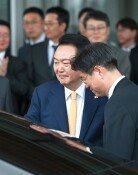Japans anime director urges Tokyo to apologize for WWII sex slavery
Japans anime director urges Tokyo to apologize for WWII sex slavery
Posted July. 20, 2013 04:15,
Hayao Miyazaki, one of Japan`s greatest animation directors who produced My Neighbor Totoro and Spirited Away, criticized the Japanese politics in a strong voice, urging Tokyo to apologize and offer compensations for World War II sex slaves for the Imperial Japanese Army and opposing Japans move to revise its peace constitution. Many Japanese citizens are showing ardent reactions to his argument.
In the July edition of Studio Ghiblis monthly free magazine Hot Wind, Miyazaki contributed an article in which he opposed Japans moves to revise its constitution and urged Tokyo to offer proper apology and compensations for the World War II sex slaves known as comfort women. The Japanese government claims that there is no evidence showing that the Imperial Japanese Army forced women to serve as sex slaves and that the compensation issue was addressed under the 1965 Korea-Japan treaty on normalizing diplomatic relations.
Miyazaki urged Japanese to admit that Japan did wrong things, although they might want to say that the pre-war Japan was not bad. Referring to the history perception of Japans leaders, including Japanese Prime Minister Shinzo Abe, Miyazaki urged them to not revise Japans constitution with a strong tone. Regarding Abes remark that his government basically respects the Murayama statement on war apology, the director asked, What does basically mean?
Miyazaki also noted that it is not fair to revise Japans constitution at a time when turnout rates are low, urging the Japanese government to reflect majority opinions as much as it can, warming against Tokyos possible attempt to revise a constitutional clause on the requirements for constitutional revisions.
Regarding Japans Self-Defense Force, Miyazaki said that despite its weird existence, it should remain as self-defense forces, rather than becoming national defense forces. Referring to Japans territorial issues with neighboring countries, he proposed that both sides divide the land in question half and half or jointly manage them, as it would be impossible to resolve the issues through the International Court of Justice.







